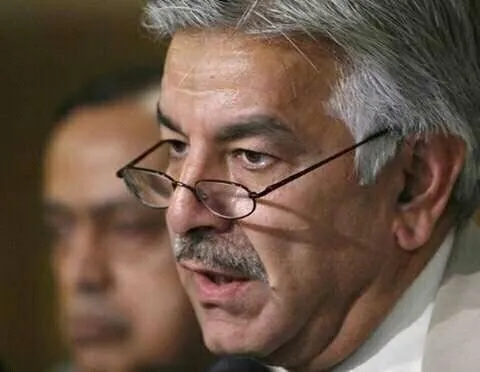Pakistan's Defence Minister Suggests Possible 'Counter-Terrorism' Operations in Afghanistan

Synopsis
Key Takeaways
- Pakistan considers military action in Afghanistan.
- Khawaja Asif criticizes the Taliban for supporting TTP.
- Airstrikes previously targeted TTP hideouts in Paktika.
- Recent train hijacking linked to terrorists in Afghanistan.
- Relations between Pakistan and Afghanistan are tense.
Islamabad, March 19 (NationPress) – On Wednesday, Pakistan's Defence Minister Khawaja Asif indicated that the nation's military might initiate an operation targeting terrorist hideouts in Afghanistan, as Islamabad seeks decisive action against groups that provide sanctuary to hostile factions.
"If we must pursue Pakistan's adversaries in any nation, we will proceed accordingly," stated Khawaja Asif, criticizing Afghanistan and the Taliban government for their support of terrorist organizations such as the Tehreek-e-Taliban Pakistan (TTP).
This remark follows a high-level meeting held on Tuesday among Pakistan's leading political and military figures, where it was resolved to eradicate terrorism in every capacity.
Islamabad has accused Afghanistan of allowing anti-Pakistan terror organizations to operate from its territory. The Sharif government has consistently asserted that the Afghan Taliban is harboring, aiding, and even financing anti-Pakistan groups.
In the past, Pakistan has conducted air strikes within Afghanistan and has claimed to have targeted and eliminated TTP militants by striking their hideouts.
The air raids in December 2024 focused on the Barmal district in Paktika province, adjacent to Pakistan's South Waziristan tribal district.
The Afghan Taliban acknowledged the airstrike, asserting that the attacks by Pakistan resulted in the deaths of at least 46 innocent individuals, including women and children.
Pakistan maintains that it possesses intelligence-based data pinpointing the exact locations of TTP militant safe havens within Afghanistan, asserting that the air strikes successfully targeted and eliminated terrorists.
Islamabad also alleges that the recent hijacking of the Jaffar Express train in Balochistan was orchestrated by terrorists who were communicating with their controllers in Afghanistan.
The attack on the Jaffar Express train in Bolan Pass carried out by the Baloch Liberation Army (BLA) led to a 36-hour standoff, resulting in numerous casualties including hostages, security personnel, and BLA militants.
This incident prompted immediate action from top civilian and military officials to enforce the revised National Action Plan (NAP) and the 'Azm-e-Istehkam' strategy to dismantle terrorist networks.
However, targeting suspected militant hideouts within Afghanistan may further strain the already tense relations between the two nations, which have been fraught for an extended period.









